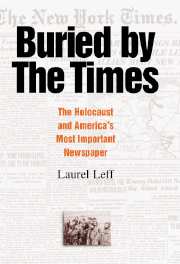Book contents
- Frontmatter
- Dedication
- Contents
- Acknowledgments
- Note Abbreviations
- Introduction: “Last Voice from the Abyss”
- PART I 1933—1941
- PART II 1942—1945
- 5 “To Awaken the Conscience of Christendom”: Pressure to Publicize the First News of the Extermination Campaign
- 6 “Amidst the Advertisements on Page 19”: Placement Decisions and the Role of the News Editors
- 7 “All Jews Are Not Brothers”: The Publisher's Fight with Zionists
- 8 “The Semitic Question Should Be Avoided”: German Atrocities and U.S. Government Propaganda
- 9 “Final Phase of Supreme Tragedy Has Begun”: The War Refugee Board and the Destruction of Hungary's Jews
- 10 “Political Prisoners, Slave Laborers, and Civilians of Many Nationalities”: The Liberation of the Concentration Camps
- 11 “Lessons from the Hitler Tragedy”: The Publisher and the Aftermath of War
- Conclusion: “The Horrible Story Was Not Told”
- Appendix A Key Individuals
- Appendix B Key Institutions
- Appendix C List of Front-Page Stories
- Notes
- Index
11 - “Lessons from the Hitler Tragedy”: The Publisher and the Aftermath of War
Published online by Cambridge University Press: 05 February 2015
- Frontmatter
- Dedication
- Contents
- Acknowledgments
- Note Abbreviations
- Introduction: “Last Voice from the Abyss”
- PART I 1933—1941
- PART II 1942—1945
- 5 “To Awaken the Conscience of Christendom”: Pressure to Publicize the First News of the Extermination Campaign
- 6 “Amidst the Advertisements on Page 19”: Placement Decisions and the Role of the News Editors
- 7 “All Jews Are Not Brothers”: The Publisher's Fight with Zionists
- 8 “The Semitic Question Should Be Avoided”: German Atrocities and U.S. Government Propaganda
- 9 “Final Phase of Supreme Tragedy Has Begun”: The War Refugee Board and the Destruction of Hungary's Jews
- 10 “Political Prisoners, Slave Laborers, and Civilians of Many Nationalities”: The Liberation of the Concentration Camps
- 11 “Lessons from the Hitler Tragedy”: The Publisher and the Aftermath of War
- Conclusion: “The Horrible Story Was Not Told”
- Appendix A Key Individuals
- Appendix B Key Institutions
- Appendix C List of Front-Page Stories
- Notes
- Index
Summary
When Arthur Sulzberger decided that Elsbet Midas Gerst's story did not have “news value,” he had just returned from a tour of the “torture camps” in Germany, as he later put it. The concentration camps had been cleaned up since his wife's cousin and his business partner Julius Ochs Adler had been there in April. In August, there were no decomposing bodies or walking corpses, but the mass graves and crematoria ruins were still evident. A year later, Sulzberger returned to Germany and visited DP camps for both Jews and non-Jews. “I talked with these people whose past is filled with horror and whose future is filled with fear and doubt,” he later said. “Their plight would move the hearts of men of stone.”
Seeing the camps and talking to DPs may have moved his heart, but those encounters did not alter his convictions. Arthur Sulzberger did not then, or ever, express regrets about the Times' coverage of what would come to be known as the Holocaust. He did not reconsider the philosophical stance that led him and his paper to downplay the extermination of the Jews. If anything, he came away from his postwar trips to Germany more convinced that he had been right and the organized Jewish community had been wrong.
At a synagogue in Chattanooga, founded by Iphigene's grandfather and supported by donations from her father, Sulzberger reaffirmed in an October 1946 speech the positions he had held during 6 years of Jewish persecution and 6 more years of Jewish annihilation.
- Type
- Chapter
- Information
- Buried by the TimesThe Holocaust and America's Most Important Newspaper, pp. 319 - 329Publisher: Cambridge University PressPrint publication year: 2005



